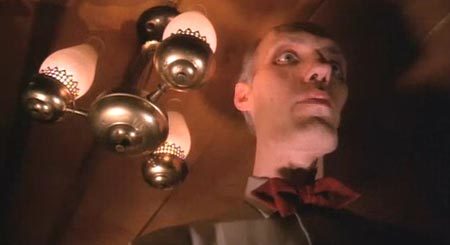I found this article in the Pasadena Weekly. When I first read the title I thought it would be more of the usual “green” stuff you find in the mainstream newspapers. I was surprised by the time I reached end of the article. I also know Christopher Nyerges, but didn’t realize the article was by him until after I finished it. He taught me what little primitive skills I know.
Nature Finds Its Balance
Learning from the Past with Veteran Actor Carel Struycken
by Christopher Nyerges
Carel Struycken has long been interested in the principles of
permaculture, not only as it relates to growing fruits and vegetables
but also in the perspective it casts on most human activities.
Struycken, who has lived in Pasadena for the past 25 years, is an
actor who played Lurch in “The Addams Family,” as well as roles in “Star
Trek,” “Men in Black,” “The Witches of Eastwick,” and others. He was
born in Holland, grew up in the Caribbean and moved back to Holland at
15. We meet on the eve of his move to Catalina Island, to discuss his
efforts at home food production and permaculture.
He shows me the Bible of permaculture, Bill Mollison’s “Permaculture:
A Designer’s Manual,” which details a way in which we can grow food and
live with the land in accord with nature’s principles. (“Permaculture”
is a coined term meaning “permanent agriculture”)
“The whole idea of permaculture is to put in as little work as
possible, and allow nature to find its balance,” says Struycken, who
produced all the vegetables for a family of five for many years using
these principles.
“I’m also a big fan of Fukuoka, author of ‘The One Straw Revolution.’
If I had the time, I’d love to go to Japan and work on his natural farm
… and learn about his methods,” says Struycken.
Both Mollison and Fukuoka are advocates of natural farming, which
means planting what is appropriate for the area, tilling as little as
possible, letting all the leaves and old plants serve as fertilizer for
the new plants, and using natural methods for bug control.
Using permaculture methods, Struycken grew lots of Asian greens,
mostly those members of the mustard family that had the highest
nutritional value. He grew herbs, tomatoes, yard-long beans, and 14
fruit trees.
He also experimented with raised beds because the soil in his garden
area was so bad.
The smaller the plot, the harder it is to practice permaculture
methods. Still, Struycken never raked up and discarded leaves.
All the kitchen scraps are recycled in many compost heaps, and he
worked at cultivating the earthworms that naturally occurred in his yard
so that they would do the tilling that farmers ordinarily do.
He purchased ladybugs years ago because they eat the “bad” insects,
and he found that they like the fennel plants. So the secret to keeping
ladybugs around is to grow fennel, explained Struycken.
Although Struycken has tried to produce all of his needed fertilizer
from his own back yard, he has found the need occasionally to bring in
chicken and horse manure for his crops. “I stopped using the horse
manure, though,” he says, “since I found that it produced too many
weeds.”
He said that though there were many spiders and bugs in his garden,
whatever bugs ate his lettuce got eaten by some other bug. This is one
of the basic principles of permaculture – that nature, largely left
alone, will find its own balance.
Struycken, who has been in the movie business for about 30 years,
wants to do a series of documentaries showing sustainable communties
throughout the world.
“The Amish are the most successful sustainable farmers and they are
using early 18th-century technologies,” he says with a smile.
Struycken pauses to explain the difference between Paleolithic and
Neolithic in order to make a point.
“Humanoids have been around for at least a million years,” he
explains, “and modern humans have been here maybe 500,000 years. The
Paleolithics were the hunter/gatherers, and the Neolithics were those
who were settled in one place and who began agriculture,” says
Struycken.
“When we settled, we had to make the effort to force ourselves into
the new mindset, but our true nature is Paleolithic,” Struycken
explains.
The Paleolithics lived in the here and now, they were more primitive
by our standards, but they controlled their populations, had fewer
taboos and laws, had fewer possessions and managed to live on what the
forest provided. He cites the Bushmen of the South African Kalahari as
an example.
“Now, when you had agricultural and cow-raising people who lived
adjacent to the primitive people, the Bushmen would rarely die of
hunger, though the agricultural people would. The agricultural people
learned to rely on, and expect, much more. When cattle died, due to
drought, for example, the agricultural people suffered far more than the
Bushmen. The farmers also had to work a lot harder, usually seven days
a week, whereas hunter/gatherers worked maybe three days a week.”
Struycken cites the Bushmen and many others to illustrate that one of
our problems is that we are so advanced that we have lost our primal
Paleolithic nature. Today systems for gardening, farming, commerce,
building, etc., are all essentially Neolithic and therefore
unsustainable into the future, according to Struycken.
In this case, Struycken believes that the details of our very survival
can be gleaned by looking to the past at the details of sustainable
societies. Struycken is optimistic, idealistic, and believes that the
solution to our problems is to properly understand the living principles
of (so-called) primitive peoples.
Christopher Nyerges is the author of “How to Survive Anywhere,” editor
of Wilderness Way magazine, and a proponent of self-reliance in the
wilderness and urban environments. He can be contacted at Box 41834,
Eagle Rock, CA 90041, or www.christophernyerges.com.

